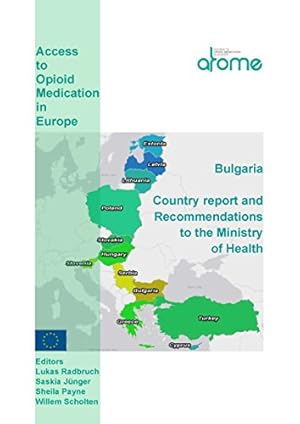Description
Bulgaria is one of the countries with statistical evidence of inadequate morphine consumption per capita. In 2006, the adequacy of opioid analgesic consumption was 8% - based on a per capita consumption of 12.20 morphine equivalents (mEq) while 156 mg would have been adequate for treatment of all pain conditions[1]. Bulgaria was selected as one of the countries to participate in the ATOME project due its low per capita consumption. Four years later, in 2010, the adequacy of opioid analgesic consumption had decreased even further in relative terms - it was only 6%[2] (based on a per capita consumption of opioid analgesics of 13.27 morphine equivalents (mEq) while 236 mEq in mg per capita would have been adequate). This report presents a summary of the results of the situational analysis that has been undertaken with regard to opioid availability and accessibility in Bulgaria. The results of the situational analysis are divided in two parts: the first part addresses legal and regulatory issues and the second part focuses on issues relating to policy. Both parts present the main barriers and recommendations for improving access to opioid medication in Bulgaria.
Tag This Book
This Book Has Been Tagged
Our Recommendation
Notify Me When The Price...
Log In to track this book on eReaderIQ.
Track These Authors
Log In to track Aukje Mantel-Teeuwisse on eReaderIQ.
Log In to track Eugenia Larjow on eReaderIQ.
Log In to track Evangelia Papavasiliou on eReaderIQ.
Log In to track Lisa Linge-Dahl on eReaderIQ.
Log In to track Marjolein Vranken on eReaderIQ.
Log In to track Thomas Lynch on eReaderIQ.
Log In to track Lukas Radbruch on eReaderIQ.
Log In to track Saskia Jünger on eReaderIQ.
Log In to track Sheila Payne on eReaderIQ.
Log In to track Willem Scholten on eReaderIQ.
